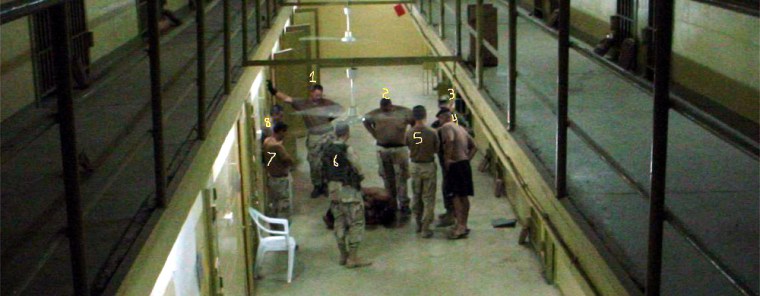Abusive treatment under the supervision of military intelligence officers may have been intentionally used as part of the interrogation of Iraqi captives at the Abu Ghraib prison, according to a previously unpublished photograph of U.S. soldiers and other personnel obtained by NBC News.
The photograph was taken during the interrogation of several Iraqi prisoners who are depicted naked in a heap on the floor, according to a military police officer who faces a court-martial in connection with alleged abuses at the notorious facility on the outskirts of Baghdad.
The officer, Spc. Charles A. Graner Jr., 35, of Greene County, Pa., is leaning against the wall in the photograph, which was provided by his attorney, Guy Womack.
Graner identified four other soldiers in the photograph, labeled Nos. 4, 5, 7 and 8 in the copy provided to NBC News, as military intelligence officers, who he said were in charge of interrogations at the prison. A civilian translator is labeled No. 2, and Graner is No. 1.
What role for military intelligence?
The involvement of military intelligence officers in encouraging abuse of detainees has emerged as a central question of the burgeoning scandal at Abu Ghraib, which has led to criminal charges against Graner and six other MPs and widespread calls for the resignation of Defense Secretary Donald Rumsfeld.
Rep. John Murtha, D-Pa., said last week that Graner had his photo taken with prisoners as proof that military intelligence officers forced him to take part in the abusive behavior.
Military police are responsible for guarding prisoners but are not supposed to be involved in interrogations. But in a report obtained last week by NBC News, Maj. Gen. Antonio M. Taguba, who led the Army’s investigation of the abuses at Abu Ghraib, quoted the testimony of a sergeant at Abu Ghraib who said military intelligence officers lobbied guards to abuse the detainees to “loosen them up” for interrogation.
“Make sure he has a bad night,” the sergeant said he was told in regard to one inmate. “Make sure he gets the treatment.”
Other unit members said inmates of high interest to military intelligence officers were segregated into a separate cellblock, where guards were expected to “break them down,” Taguba wrote.
Taguba blamed, in part, a confused chain of command after Nov. 19, when the 205th Military Intelligence Brigade was given responsibility for Abu Ghraib prison and authority over the 800th Military Police Brigade. He reiterated that guards should play no role in the interrogation of prisoners.
Geneva Conventions debated
The photograph could also be important in determining whether interrogation techniques used at the prison were improper in themselves.
Questions have also been raised about the Defense Department’s list of approved rules for interrogations and whether they violate the Geneva Conventions, a series of international treaties that govern the appropriate treatment of prisoners of war.
Rumsfeld told lawmakers this week that the detainees at Abu Ghraib were covered by the conventions.
The conventions state specifically that while being interrogated, prisoners “may not be threatened, insulted or exposed to any unpleasant ... treatment of any kind.”
But the list of approved U.S. guidelines allows interrogators to subject prisoners to sleep and sensory deprivation for up to 72 hours and force them to hold “stress positions” for as long as 45 minutes, threaten them with guard dogs, keep them isolated for longer than 30 days and manipulate their diets.
Senators challenged Deputy Defense Secretary Paul Wolfowitz over the rules at a hearing Thursday of the Armed Services Committee.
“A bag over your head for 72 hours — is that humane?” asked Sen. Jack Reed, D-R.I.
When Wolfowitz began to answer by saying, “Let me come back to what you said the work of the government ..., ” Reed cut him off and demanded: “No, no — answer the question, secretary.”
Wolfowitz conceded, “What you’ve described to me sounds, to me, like a violation of the Geneva Convention.”
Gen. Peter Pace, vice chairman of the Joint Chiefs of Staff, went a step further, saying directly: “I would describe it as a violation, sir.”
